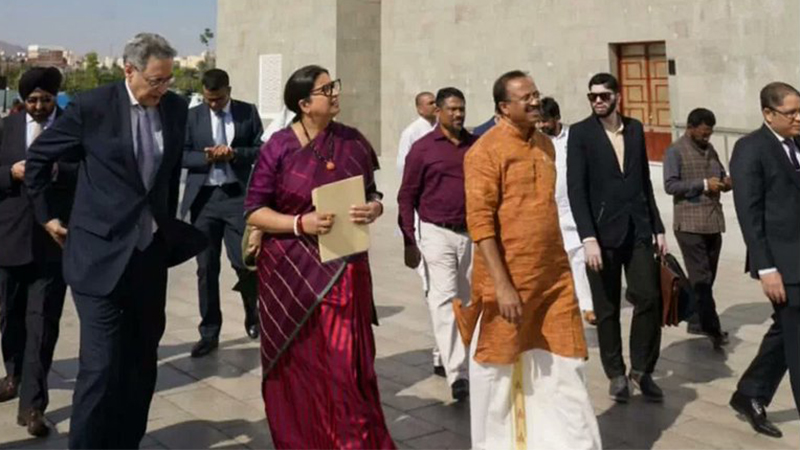Images of the recent visit by Minority Affairs Minister Smriti Irani to the holy city of Medina, in Saudi Arabia, are still doing the rounds. Irani and Nirupama Kotru, Joint Secretary Minority Affairs, who accompanied her, are seen without a headscarf in the kingdom, where religious sentiments symbolic of piety continue to rule.
Both of them, most noticeably, were the only two non-Muslim Indian women on the trip. The missing headscarf, however, highlighted how this very first non-Muslim delegation’s mission from India to Medina – in response to a special gesture extended by Saudi Arabia – could be the beginning of more than just a favourable relationship between the two countries.
Smriti’s gesture, from a feminist viewpoint, is encouraging. On January 8, the Indian delegation visited the periphery of the Prophet’s Mosque (Al-Masjid an-Nabawi), located in the heart of Medina, the city that is considered second holiest only to Mecca. This was followed by a pilgrimage to Mount Uhud, in the north of Medina, and the Quba Mosque, believed to be the first mosque in the world. The mission can be perceived as a significant honour considering how foreign non-Muslim delegations are rarely taken for a visit to these sites.
The world in general, politics particularly, is a male bastion. For a woman to know her place and keep it without trying too hard is a task. That said, Irani’s portfolio politically, her background as a Hindu, and what she represents by her attire – the sari – are loud enough to demystify gender equations and pave the way for women to visit Saudi Arabia without having to dread breaking the rules, if at all.
Larger picture
Saudi Arabia’s Crown Prince Mohammed bin Salman Al Saud, popularly known as MBS, has been spearheading social reforms to modernise his country, ever since he took charge in 2017. His initiative to have the Indian delegation over, and his gesture towards Irani can also be viewed from this perspective of welcoming change. The warmth and respect the Indian delegation received in Saudi Arabia cannot be understated.
The most significant takeaway from this trip is how countries, which are culturally and religiously diverse from Saudi Arabia, can still be hopeful of sharing a closer bond with the Islamic kingdom – rich in culture and controversy.
What to expect
India’s ties with the Gulf nations have improved significantly over the last few years. Yet bridging religious and cultural differences before signing up for mutual development plans with any part of West Asia remains a challenge until now. With this trip of the Union Minister, we can hope for a political shift that benefits us. Just as Saudi Arabia and the United Arab Emirates (UAE) have been initiating friendly ties with other countries and encouraging world leaders to forge bonds with them, India can now – without inhibition – assert its identity on the world stage. – The writer is Executive Editor of Nrifocus.com


Leave a Reply